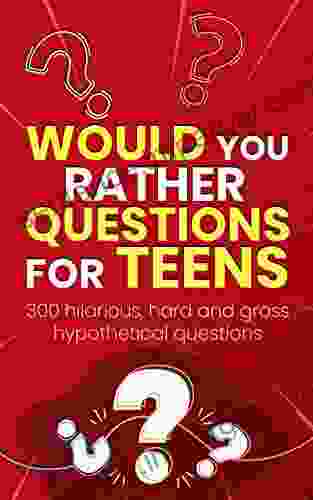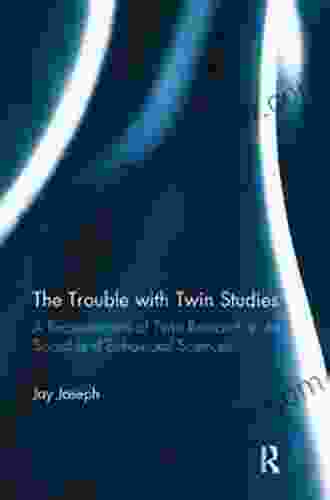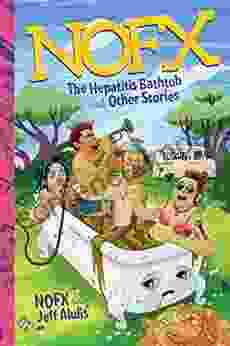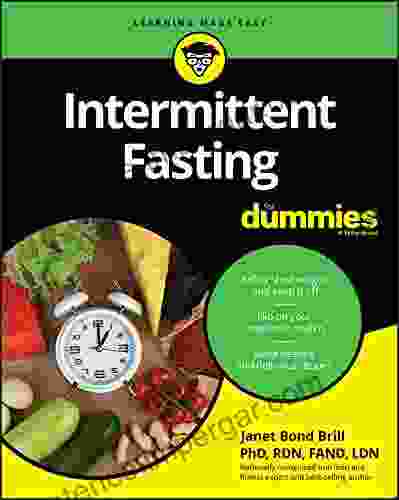The Trouble With Twin Studies: Exposing the Flawed Science Behind Heritability Claims

5 out of 5
| Language | : | English |
| File size | : | 3593 KB |
| Text-to-Speech | : | Enabled |
| Screen Reader | : | Supported |
| Enhanced typesetting | : | Enabled |
| Word Wise | : | Enabled |
| Print length | : | 330 pages |
Twin studies have long been touted as a powerful tool for understanding the role of genes in human behavior. By comparing identical (monozygotic) twins, who share 100% of their genes, with fraternal (dizygotic) twins, who share only 50% of their genes, researchers have claimed to be able to estimate the heritability of various traits, from intelligence to personality to mental illness.
However, as this book demonstrates, twin studies are fraught with methodological problems and biases that make their s highly questionable. The authors, Jay Joseph and John \(\beta\)aS, meticulously examine the evidence and expose the many ways in which twin studies have been used to promote a narrow and deterministic view of human nature.
The Assumptions of Twin Studies
Twin studies rely on a number of assumptions, including:
* That identical twins are raised in the same environment as fraternal twins. * That the only difference between identical and fraternal twins is their genetic relatedness. * That genetic differences between twins are the only cause of phenotypic differences between twins.
These assumptions are often not met in practice, however. Identical twins are often treated differently from fraternal twins, even from birth. They may be dressed alike, given the same toys, and expected to behave in the same way. This can create a shared environment that is more similar for identical twins than for fraternal twins, even if they are raised in the same home.
In addition, identical twins may have different experiences in the womb or during birth. These experiences can lead to epigenetic changes that can affect gene expression and, ultimately, behavior. These epigenetic differences can be mistaken for genetic differences, leading to inflated estimates of heritability.
The Biases of Twin Studies
Twin studies are also subject to a number of biases, including:
* The volunteer bias: Twin studies often rely on volunteers, who may not be representative of the general population. This can lead to biased results, as volunteers may be more likely to have certain traits or experiences that could influence the results of the study. * The ascertainment bias: Twin studies often focus on twins who have been identified as having a particular trait or disFree Download. This can lead to biased results, as twins who do not have the trait or disFree Download may be less likely to be included in the study. * The publication bias: Twin studies that find significant results are more likely to be published than studies that do not find significant results. This can lead to a distorted view of the evidence, as studies with negative results are less likely to be seen by researchers and policymakers.
These biases can all lead to inflated estimates of heritability and an overemphasis on the role of genes in human behavior.
The Implications of Twin Studies
The overreliance on twin studies has had a number of negative consequences, including:
* It has led to a narrow and deterministic view of human nature. Twin studies have been used to argue that human behavior is largely determined by our genes, leaving little room for the influence of environment and experience. * It has justified social inequality. Twin studies have been used to argue that social inequality is largely due to genetic differences, rather than social factors. This has been used to justify policies that perpetuate inequality, such as the denial of educational and economic opportunities to the poor. * It has hindered progress in understanding complex traits. Twin studies have focused on simple, easily measured traits, such as height and weight. This has led to a neglect of more complex traits, such as intelligence and personality, which are more difficult to measure and are more likely to be influenced by environmental factors.
Twin studies are a flawed tool for understanding the role of genes in human behavior. They are based on a number of assumptions and biases that can lead to inflated estimates of heritability and an overemphasis on the role of genes. The overreliance on twin studies has had a number of negative consequences, including a narrow and deterministic view of human nature, the justification of social inequality, and the hindrance of progress in understanding complex traits.
It is time to move beyond twin studies and adopt a more nuanced and comprehensive approach to understanding human behavior. This approach must take into account the complex interplay of genes, environment, and experience. Only then can we truly understand the factors that shape who we are and why we behave the way we do.
5 out of 5
| Language | : | English |
| File size | : | 3593 KB |
| Text-to-Speech | : | Enabled |
| Screen Reader | : | Supported |
| Enhanced typesetting | : | Enabled |
| Word Wise | : | Enabled |
| Print length | : | 330 pages |
Do you want to contribute by writing guest posts on this blog?
Please contact us and send us a resume of previous articles that you have written.
 Book
Book Novel
Novel Page
Page Chapter
Chapter Text
Text Story
Story Genre
Genre Reader
Reader Library
Library Paperback
Paperback E-book
E-book Magazine
Magazine Newspaper
Newspaper Paragraph
Paragraph Sentence
Sentence Bookmark
Bookmark Shelf
Shelf Glossary
Glossary Bibliography
Bibliography Foreword
Foreword Preface
Preface Synopsis
Synopsis Annotation
Annotation Footnote
Footnote Manuscript
Manuscript Scroll
Scroll Codex
Codex Tome
Tome Bestseller
Bestseller Classics
Classics Library card
Library card Narrative
Narrative Biography
Biography Autobiography
Autobiography Memoir
Memoir Reference
Reference Encyclopedia
Encyclopedia Jeanne D Petit
Jeanne D Petit Jane Isay
Jane Isay James C Carpenter
James C Carpenter James Gilbert
James Gilbert James Hannay
James Hannay Jeff Mclinden
Jeff Mclinden James H Whittaker
James H Whittaker James P Carse
James P Carse Janet Barrett
Janet Barrett Jeanne Mcculloch
Jeanne Mcculloch Jane Mcclaren
Jane Mcclaren James Waldroop
James Waldroop Javadga Pierre
Javadga Pierre James A Mckenna
James A Mckenna Jan Pinski
Jan Pinski Jake Halpern
Jake Halpern James Desborough
James Desborough James Morton
James Morton James H Austin
James H Austin James Edgar Skye
James Edgar Skye
Light bulbAdvertise smarter! Our strategic ad space ensures maximum exposure. Reserve your spot today!

 Bob CooperIndulge in Laughter with "300 Hilarious Hard and Gross Hypothetical Questions...
Bob CooperIndulge in Laughter with "300 Hilarious Hard and Gross Hypothetical Questions... Felix HayesFollow ·10k
Felix HayesFollow ·10k Hunter MitchellFollow ·10.5k
Hunter MitchellFollow ·10.5k Michael CrichtonFollow ·10.3k
Michael CrichtonFollow ·10.3k Devin RossFollow ·13.1k
Devin RossFollow ·13.1k Jon ReedFollow ·11.9k
Jon ReedFollow ·11.9k Cortez ReedFollow ·12.7k
Cortez ReedFollow ·12.7k Caleb CarterFollow ·12.4k
Caleb CarterFollow ·12.4k Amir SimmonsFollow ·14.3k
Amir SimmonsFollow ·14.3k

 Jacob Foster
Jacob FosterPrinciples and Persons: The Legacy of Derek Parfit
Derek Parfit's 1984 book,...

 Leo Mitchell
Leo MitchellPartners For Life: Raise Support For Your Missionary Work...
Are you a missionary or ministry leader...

 Blake Kennedy
Blake KennedyOn Desperate Ground: A Gripping Account of World War II's...
Hampton Sides' "On...

 Duane Kelly
Duane KellyCriminal Minds Sociopaths Serial Killers And Other...
In the realm of criminology,...

 Craig Blair
Craig BlairHome Repair: The Ultimate Guide to Fix, Maintain, and...
Welcome to the...

 Elmer Powell
Elmer PowellThe Organic Grower Guide to Mycorrhizae Science for...
Unlock the Secrets of Soil...
5 out of 5
| Language | : | English |
| File size | : | 3593 KB |
| Text-to-Speech | : | Enabled |
| Screen Reader | : | Supported |
| Enhanced typesetting | : | Enabled |
| Word Wise | : | Enabled |
| Print length | : | 330 pages |









